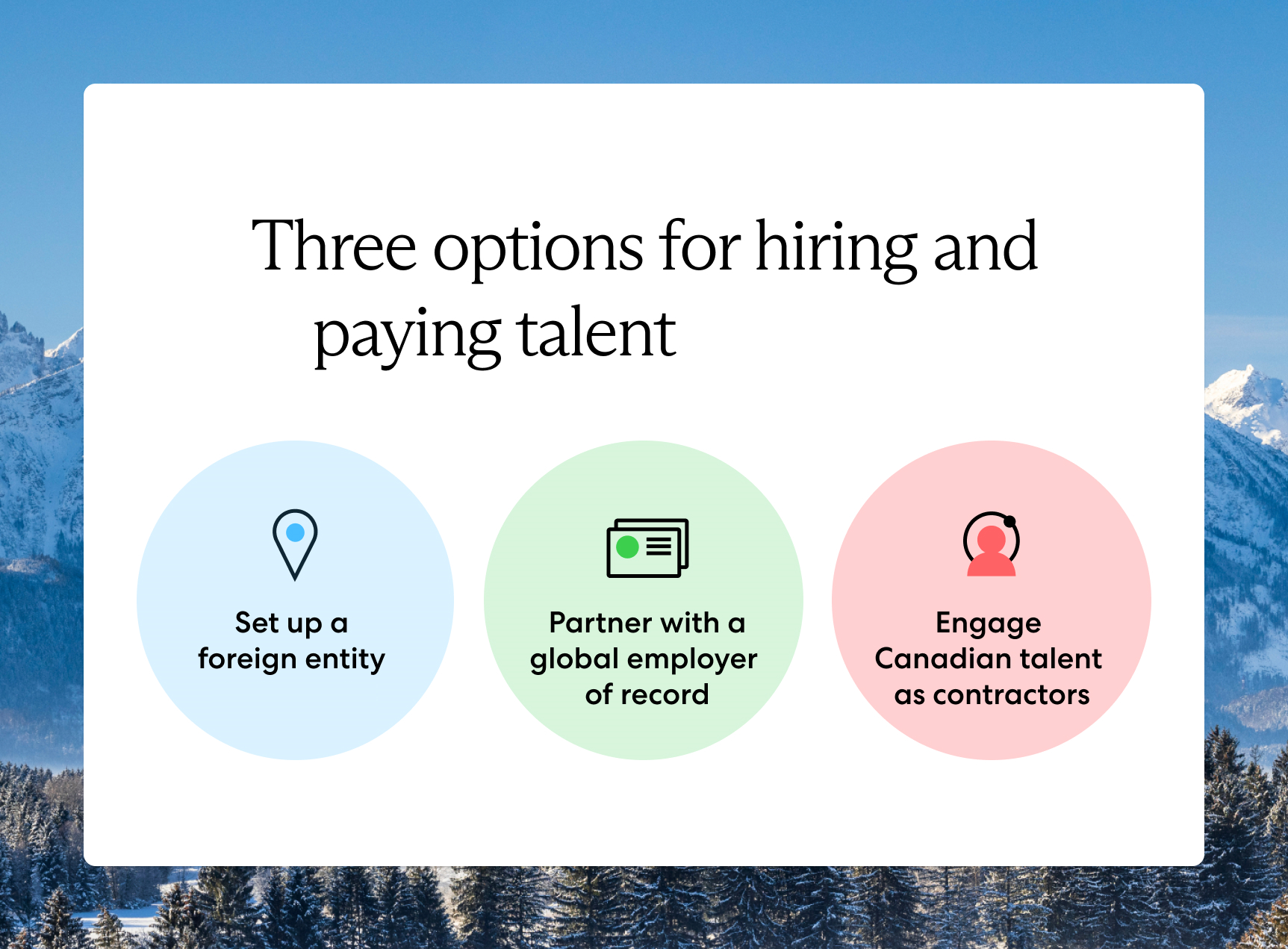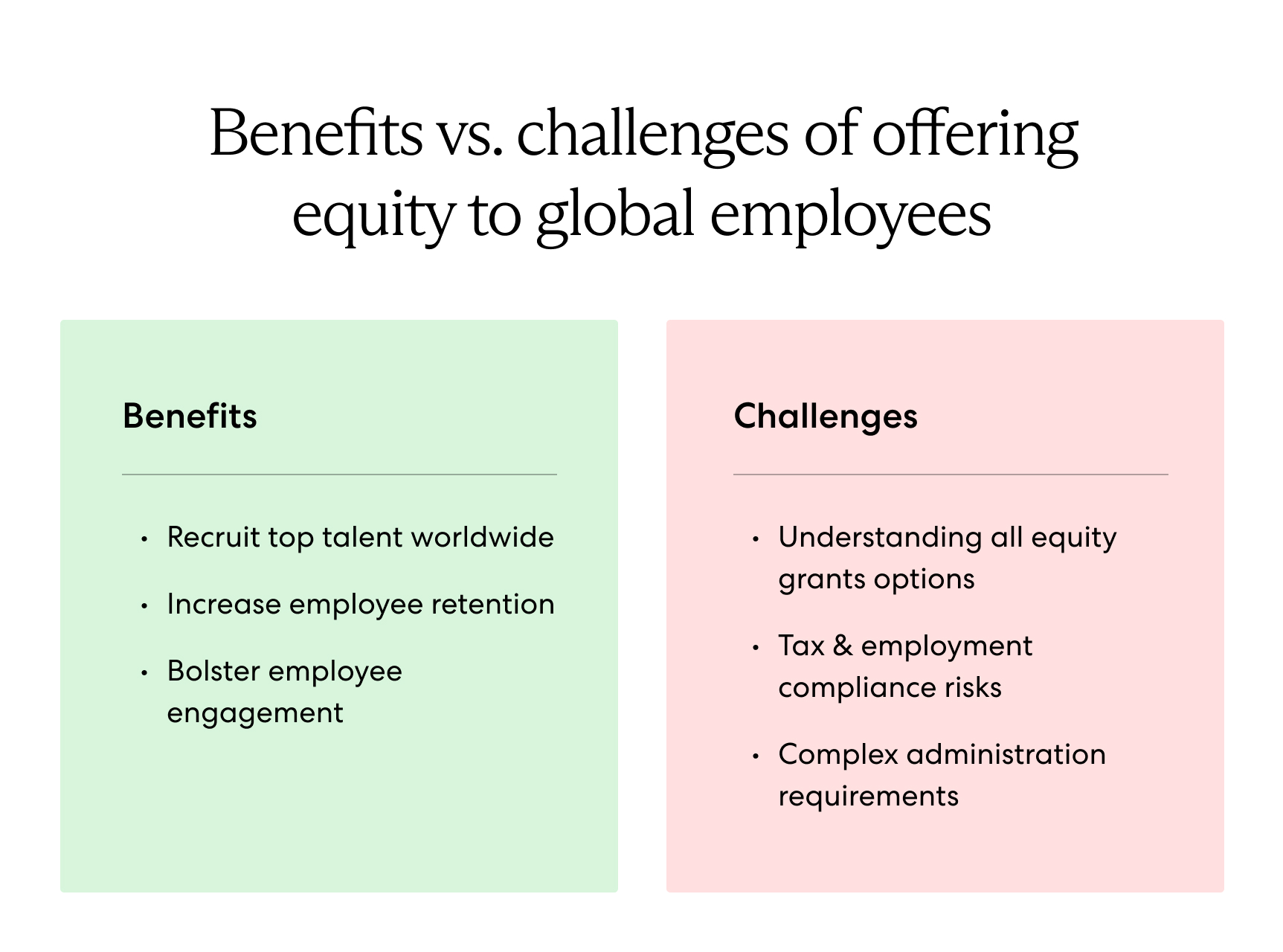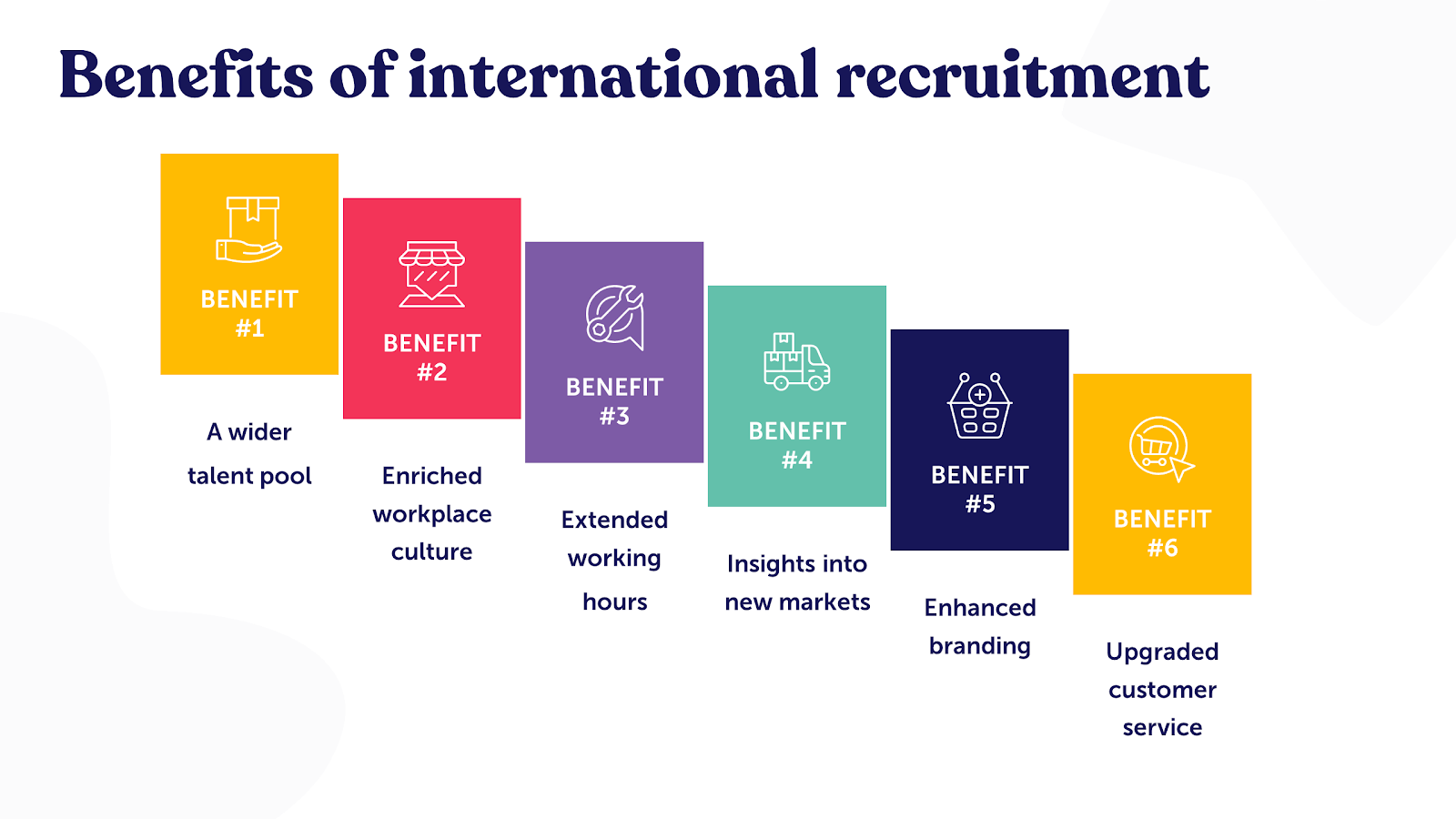
In today's interconnected world, what Are The Various Options A Company Has While Hiring Internationally?businesses are faced with a plethora of options when venturing into international hiring. From navigating visa regulations to embracing remote workmodels, the spectrum of choices available to companies seeking global talent is vast and dynamic. One avenue involves exploring local talent pools through satellite offices or establishing subsidiaries abroad, enabling direct access to diverse skill sets and cultural insights.
Moreover, the advent of remote work has revolutionized international hiring, granting businesses unprecedented access to talent across borders without the constraints of physical location. Embracing remote teams not only breaks down geographical barriers but also allows companies to benefit from a global talent pool, fostering innovation and diverse perspectives.
What Are The Options A Company Has While Hiring Internationally?
There are a few options a company has while hiring internationally:
1. Outsource to a specialized recruitment agency - Specialized recruitment firms are experts in international recruitment and can help you find the right candidates for your needs. They can also help you with the legal and administrative aspects of hiring international employees.
2. Hire independent contractors -Independent contractors are not considered employees, so you do not need to worry about payroll, taxes, or benefits. This can be a good option if you need to hire employees for temporary work or to fit restricted budgets and avoid time-consuming training processes.
3. Use an employer of record (EOR) - An EOR is a third-party company that handles all of the legal and administrative aspects of hiring employees in another country. This can be a good option if you want to avoid the hassle of setting up a local legal entity or sponsoring foreign employees.
4. Sponsor foreign employees -This option involves sponsoring foreign employees to obtain a work visa and relocate to your country. This can be a good option if you need to hire employees with specific skills or experience that are not available in your country.
5. Set up a local legal entity -This is the most traditional option, and it involves creating a new company in the country where you want to hire employees. This can be a complex and time-consuming process, but it gives you the most control over your hiring process.
The best option for your company will depend on a number of factors, including the size of your company, the countries where you want to hire employees, and the type of employees you need.
Here are some additional things to consider when hiring internationally:
- Immigration laws -Make sure that you are compliant with all applicable immigration laws. This may involve obtaining work visas for foreign employees or sponsoring them for green cards.
- Cultural differences -Be aware of the cultural differences between your company's home country and the countries where you are hiring employees. This will help you to avoid misunderstandings and create a more inclusive workplace.
- Language barriers - Make sure that your company has the resources to communicate effectively with international employees. This may involve hiring bilingual staff or providing translation services.
Sponsor An International Employee To Obtain A Visa
Sponsoring an international employee to obtain a visa can be a complex process, but it can also be a rewarding one. By hiring international employees, companies can access a wider pool of talent, gain new perspectives, and expand their reach into new markets.
Benefits Of Sponsoring An International Employee
- Expand Reach into New Markets -By hiring international employees, companies can gain insights into new markets and cultures. This can help them to develop new products and services, as well as to expand their customer base.
- Gain New Perspectives -International employees can bring fresh ideas and perspectives to a company, which can help to boost innovation and creativity. They can also help a company to better understand different cultures and markets, which can be invaluable for businesses that are expanding internationally.
- Access to a Wider Pool of Talent -With the global talent pool becoming increasingly interconnected, companies can now tap into talent from all over the world. This can be especially beneficial for companies that are looking for specialized skills or expertise that may not be readily available in their local market.
Considerations For Sponsoring An International Employee
There are a few additional considerations that companies should keep in mind when sponsoring an international employee:
- Cultural Sensitivity -It is important to be culturally sensitive when working with international employees. This means being aware of the different cultures and customs of your employees and being respectful of their differences.
- Compliance -Companies need to be compliant with all applicable immigration laws and regulations. This can be a complex area of law, so it is important to seek legal counsel if necessary.
- Cost -Sponsoring an international employee can be a costly process. Companies will need to factor in the cost of filing petitions, obtaining visas, and providing relocation assistance.
By carefully considering these factors, companies can make an informed decision about whether or not to sponsor an international employee. In many cases, the benefits of hiring international employees can outweigh the costs and challenges.
What Are Effective Recruiting Strategies For International Recruiting And Why Are They Effective?
Effective international recruiting strategies involve a comprehensive approach that considers cultural nuances, utilizes appropriate platforms, and fosters a strong employer brand. Here are some key strategies that contribute to successful international recruitment:
- Promote Diversity and Inclusion -Embracing a diverse and inclusive workplace culture is essential for attracting and retaining international talent. Foster an environment where employees from different backgrounds feel valued and respected.
- Provide Relocation Support and Cultural Training -Offer assistance with relocation, visa processing, and cultural integration for international hires. This demonstrates your commitment to their well-being and helps them acclimate smoothly to their new environment.
- Streamline the Application and Interview Process - Make it easy for international candidates to apply and participate in the interview process. Use video conferencing tools to accommodate different time zones and consider offering remote interviews for initial screenings.
- Partner with Local Recruitment Agencies -Collaborate with experienced recruitment agencies in your target countries. They can provide valuable insights into local employment practices, regulations, and cultural norms, making your recruitment process more effective.
- Leverage Employee Referral Programs - Encourage existing international employees to refer their colleagues and friends. This can be a powerful source of highly qualified candidates who are already familiar with your company culture.
- Tailor Recruitment Adsto Specific Regions -Customize job postings and marketing materials to reflect the cultural context and language preferences of each target market. This ensures your messages are relevant and engaging for local candidates.
- Build an International Employer Brand -Develop a strong employer brand that resonates with a global audience. Highlight your company's culture, values, and commitment to diversity and inclusion. Share success stories of international employees to showcase your commitment to global talent.
- Ensure Multi-Language Accessibility -Translate job postings, company websites, and other relevant materials into the languages of your target markets. This demonstrates respect for cultural diversity and makes it easier for candidates to understand your offerings.
- Identify New Sourcing Platforms -Expand your reach beyond traditional job boards. Explore niche platforms, professional networking sites, and social mediagroups relevant to your industry and target countries. These platforms allow you to connect with a diverse range of qualified candidates.
- Define Your Ideal Candidate - Clearly outline the skills, experience, and cultural fit that align with the specific role and your company's values. This ensures you attract the most suitable candidates from a global talent pool.
Leveraging Remote Workforce Strategies
Leveraging remote workforce strategies can help companies maintain productivity and engagement while offering employees greater flexibility and work-life balance. Here are some key strategies to consider:
1. Measure and evaluate remote work effectiveness -Track productivity metrics, employee engagement, and team performance to assess the effectiveness of remote work strategies. Gather feedback from employees to identify areas for improvement.
2. Provide ongoing training and support -Offer regular training and development opportunities for remote employees to stay up-to-date on skills and knowledge. Provide support for remote onboarding, troubleshooting, and performance management.
3. Promote work-life balance -Encourage remote employees to set boundaries between work and personal life. Provide flexible work arrangements and promote healthy habits to prevent burnout.
4. Foster a culture of communication and collaboration -Encourage regular communication and collaboration among remote employees. Use virtual meetings, instant messaging, and team-building activities to keep everyone connected.
5. Invest in the right tools and technology -Provide remote employees with the necessary tools and technology to collaborate effectively, such as video conferencing software, cloud-based file sharing platforms, and project management tools.
6. Establish clear expectations and guidelines -Clearly define roles, responsibilities, and performance expectations for remote employees. Set guidelines for communication, availability, and work hours.
By implementing these strategies, companies can effectively leverage remote work arrangements to enhance employee satisfaction, boost productivity, and achieve businessgoals.
Training And Development On A Global Scale
Training and development (T&D) on a global scale is a complex but essential undertaking for multinational companies. With a dispersed workforce spread across different time zones, cultures, and languages, delivering effective and consistent training programs can be challenging. However, the benefits of a well-structured global T&D strategy are numerous, including:
- Improved employee performance and productivity -By providing employees with the skills and knowledge they need to succeed in their roles, companies can enhance their overall performance and productivity.
- Enhanced employee engagement and retention -Investing in employee development demonstrates a company's commitment to its workforce, which can lead to increased employee engagement, satisfaction, and retention.
- Strengthened global brand and reputation -A well-trained and knowledgeable global workforce can positively impact a company's brand and reputation, making it more attractive to customers, investors, and potential employees.
- Increased adaptability and agility -In today's rapidly changing businessenvironment, companies need to be able to adapt quickly to new challenges and opportunities. A global T&D strategy can help employees develop the skills and mindset needed to be agile and adaptable.
To Effectively Implement A Global T&D Strategy, Companies Need To Consider The Following Factors:
- Cultural sensitivity -Training contentand delivery methods need to be culturally sensitive and tailored to the specific needs and learning styles of employees from different backgrounds.
- Language localization -Training materials should be translated into the native languages of the target audience to ensure clear understanding and engagement.
- Technology utilization -Leveraging technology, such as e-learning platforms, video conferencing, and virtual reality, can help deliver training in a more engaging, accessible, and cost-effective manner.
- Local partnerships -Collaborating with local training providers and experts can provide valuable insights into cultural nuances and ensure that training programs are relevant to the local context.
- Performance measurement -Continuously evaluating the effectiveness of training programs and tracking employee performance metrics can help identify areas for improvement and ensure that training is aligned with business goals.
Frequently Asked Questions About What Are The Various Options A Company Has While Hiring Internationally?
What Is The Meaning Of EOR?
An employer of record (EOR) is an entity that legally employs workers on behalf of another business. An EOR takes full responsibility for all aspects of employment including compliance, payroll, taxes, and benefits.
How Do I Employ Foreign Workers In The UK?
Obtain a Sponsor Licence In order to be eligible for a sponsor licence, you need to demonstrate that the job vacancy is genuine and the suitable candidate is a foreign national. The process of obtaining a sponsor licence will usually include an audit of the company's HR policies and procedures.
How Is Recruitment And Selection Done Globally?
Consider partnering with local recruiters or utilizing virtual recruitment platforms that specialize in global talent acquisition to expand your reach and access a diverse pool of candidates. There are many free and paid job listing platforms available online that support you through global talent acquisition.
Conclusion
The realm of international hiring presents an expansive landscape of opportunities and challenges for companies seeking to diversify their talent pool. From establishing physical presence through overseas offices or subsidiaries to embracing the flexibility of remote work, businesses encounter a myriad of options to access global talent. Leveraging the gig economy and freelance platforms allows companies to tap into specialized skills across borders, fostering agility and cost-effectiveness.
Successful international hiring also demands an adaptive HR strategy that embraces cultural diversity and inclusivity while tailoring recruitment, retention, and training approaches on a global scale. Ultimately, companies must craft a comprehensive strategy that aligns with their objectives, assesses potential risks, and charts a clear roadmap for effective global talent acquisition.


